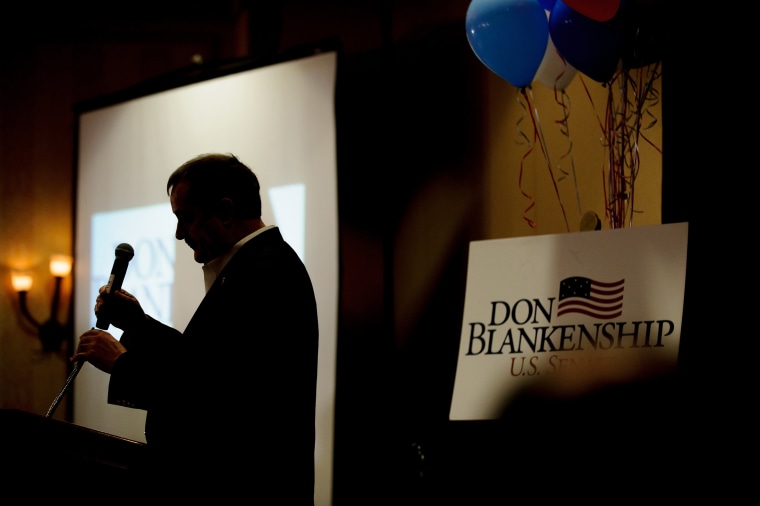WASHINGTON — Don Blankenship got all dressed up, but had nowhere to go.
The coal baron-turned ex-convict, whose campaign said he spent Election Day buying a new "general election suit," conceded West Virginia's Republican Senate primary on Tuesday night.
"My advisers tell me it's time to concede, so I'm conceding the election," he told supporters shortly after 10 p.m.
NBC News projected that Attorney General Patrick Morrisey was the winner, edging out Rep. Evan Jenkins, R-W.Va., who had been targeted by Democrats. That left Blankenship in a distant third.
President Donald Trump, who had called on West Virginia voters not to cast their ballots for Blankenship because he couldn't win in November, tweeted about the election results Wednesday morning, not mentioning him by name but saying all the Republicans who won Tuesday night have a "great chance" of winning against Democrats this year.
Morrisey will face Democratic Sen. Joe Manchin, who faces a tough re-election battle, in November.
Senate Majority Leader Mitch McConnell, R-Ky., who wanted to see Blankenship defeated, celebrated the result. His campaign tweeted a photoshopped image of the most powerful man in the Senate emerging from a cloud of cocaine, mocking Blankenship for labeling McConnell "cocaine Mitch."
It was just one of many cruel comments Blankenship made about McConnell, his wife, Treasury Secretary Elaine Chao, and her father, a Chinese-American shipping magnate whom Blankenship called a "China person."
The fact that cocaine had reportedly once been found on one of Chao's father's ships led to the druggy moniker.
"Don Blankenship played the race card and West Virginia Republicans flipped it back in his face," said Steven Law, the president of a McConnell-aligned super PAC, the Senate Leadership Fund, that ran ads against Blankenship.
With nearly 90 percent of the votes in, Blankenship had 20.1 percent and 26,176 votes, Jenkins was at 29.3 percent and 38,210 votes and Morrisey was on top with 34.5 percent and 44,988 votes.
Tuesday kicked off the 2018 battle for the Senate, offering mixed results for outsider candidates despite the electorate's anti-incumbent mood.
Primaries were also held in Indiana, Ohio and North Carolina.
In Indiana, businessman Mike Braun easily defeated two members of Congress to win the Republican Senate primary, NBC News projected. He'll face Sen. Joe Donnelly, one of the most endangered Democrats in the Senate.
Braun, like other GOP Senate candidates this year, ran as a mini-Trump, with one ad declaring, "Politicians put Mexico before Muncie, Beijing before Bloomington," referring to Indiana locales.
But Braun was more polished than other anti-establishment crusaders, and Washington operatives think he'll make for a strong candidate in the general election.
In Ohio, firebrand liberal Dennis Kucinich got romped by Richard Cordray, the mild-mannered former head of the Consumer Finance Protection Bureau, in a Democratic primary to be governor of Ohio.
Greg Pence is likely on his way to filling the congressional seat formerly occupied by his younger brother, Vice President Mike Pence, after winning a GOP primary in a deeply conservative part of Indiana.
And a Republican congressman, Rep. Robert Pittinger, R-N.C., conceded to a conservative challenger who defeated him in a primary there.
But the main event was West Virginia.
The state gave President Donald Trump his biggest victory in 2016, but Republicans grew nervous as Blankenship surged in internal polls as his two rivals attacked each other.
They worried his victory could have led to another fiasco like Alabama, where they sacrificed a winnable Senate seat by nominating Roy Moore, a candidate who was accused of sexual misconduct with young women and teenagers decades ago.
Blankenship's crime was different, however. "Roy Moore never got 29 people incinerated beyond being recognizable as human beings," Bob Kincaid, a West Virginia radio host, said on MSNBC.
Blankenship was convicted of conspiring to violate safety rules at a mine he owned, where an explosion killed 29 miners in 2010. He served a year in prison; his parole is set to expire Wednesday.
But Blankenship's "Trumpier than Trump" swagger, as he dubbed himself, seemed like it could resonate with voters — even if the president himself was urging Republicans to vote for any one else.
He "can't win the General Election," Trump warned on Twitter on Monday. Democrats seemed to agree, spending over $1.1 million through a super PAC to attack Jenkins in the hope they could engineer Blankenship's victory.
Blankenship shrugged off Trump's anti-endorsement as just more establishment meddling. "No one, and I mean no one, will tell us how to vote," he said.
In the end, however, four-out-of-five West Virginia Republicans voted against him.
